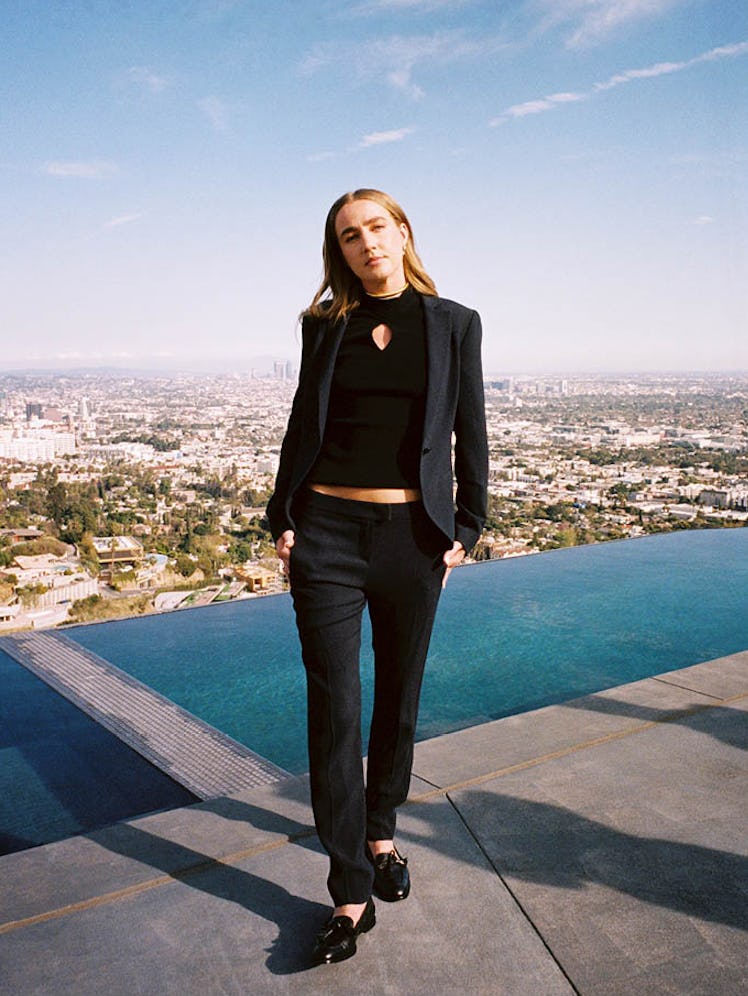Ingrid Andress Is Keeping Country Music Relevant
The Grammy-nominated singer-songwriter takes a non-traditional approach to the genre.

If you think of country music as staid and traditional, Ingrid Andress wants you to reconsider. A singer-songwriter at the vanguard of the genre’s latest metamorphosis, Andress croons about heartbreak, family drama, and unwinding with a good glass of tequila—all with a contemporary, feminist spin. Before the release of her new short film, A Lady Like That—which just premiered on Amazon Music and documents her experience at the 2021 Grammys, where she was nominated for three awards, including Best New Artist and Best Country Album for her debut record Lady Like—Andress spoke to W for our annual Music Issue. Here, she opens up about collaborating with Charli XCX, sneakily listening to pop-punk as a kid, and her thoughts on how country music is always evolving.
Lady Like, your debut country album, just garnered three Grammy nominations. Before that, you were known for writing songs for other artists in a variety of musical genres, including “Boys,” which you cowrote for Charli XCX. How did writing for other artists affect how you found your own voice?
When you write from your perspective, even for artists who are completely different from you, it does not matter what genre you are. If it is a universal feeling, then it is all the same. At the end of the day, it comes down to the song and people’s stories.
You grew up in Colorado, were planning to move to Los Angeles, and then settled in Nashville about seven years ago. Growing up, did you always know you wanted to be a musician?
I always wanted to be a performer and an artist, but I wanted to take the time to learn how to write my own songs before I did that. By working with other artists and writing for them, I learned what would work for me. For a while, I didn’t think I was an artist, because I was working with all of these people who did not really have an opinion or a perspective. And I was just like, Well, I have lots of opinions, so I must not be an artist, because it is hard for me to not express myself. But I finally was just like, Oh, well, maybe that is actually what makes you an artist.
Who were your biggest musical influences when you were growing up?
My parents were very conservative, so they were really, really strict on what we were allowed to listen to. I had friends in my neighborhood burn me CDs, and I secretly listened to them. Garth Brooks, Blink-182, Slipknot—it was all over the place. The music I gravitated toward had strong emotion in it: the Chicks, John Denver, Amy Grant. Whitney Houston is probably my favorite female vocalist of all time, along with Faith Hill. I wanted to be Faith Hill. I loved any artist where you could hear the emotion in their voice and be like, This makes me feel something, even though I have never been through this before in my whole life, because I am 10 years old, but for some reason, I am upset now that I have listened to this song.
Have you noticed a change in the general public’s perception of what constitutes country music during your career? Your sound crosses over from country to pop to folk, and your lyrics have a very outspoken, feminist appeal.
Country, if people really think about it, has always been sort of a genre-bending category. Look at Johnny Cash. He came to Nashville and everybody was like, “You are not country.” Even stuff that Dolly Parton was singing about and doing back then, they were just like, “That is controversial; that is not the country we want.” It is a cycle that keeps happening, and to me, that is what keeps it exciting and relevant to society. If anything, the genre is notorious for expanding and just keeping up with what is happening in people’s lives.
Hair by Amanda Lee at Mane Addicts; makeup by Emily Cheng for Armani Beauty at the Wall Group; photo assistant: Francesca Sostar; fashion assistant: Amanda Glickman.
This article was originally published on